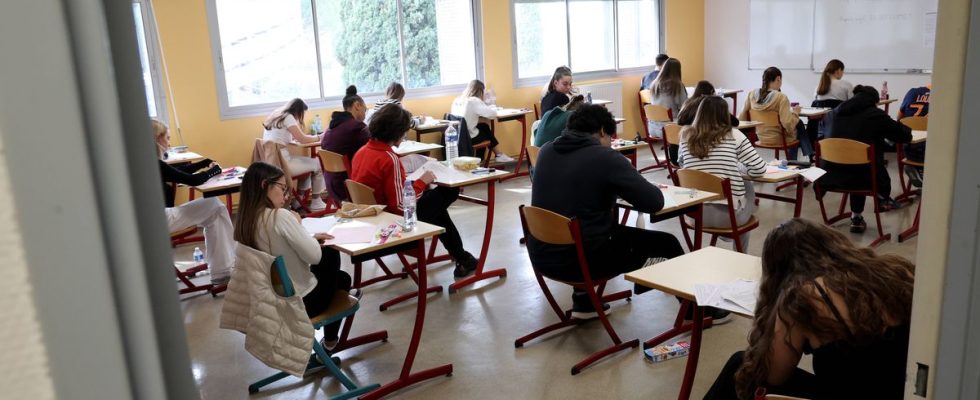It’s been thirty years! Each year, the Ministry of Education publishes the added value indicators for high schools (Ival). The 2023 edition is available on the ministry’s website from this Wednesday, and this year it is accompanied for the first time by college added value indicators (Ivac).
For high schools, these indicators assess not only the success of final year students in the baccalaureate, but also the establishment’s ability to support the maximum number of second year students until they obtain their diploma, as well as the difference between the results obtained by this school and those which were hoped for. All this taking into account the socio-demographic and academic characteristics of the students. So much data used by several media to make high school rankings, each with its own methodology. The Student, The Express, THE World, THE Dot, The Figaro, as well as many regional dailies, ensure that they are widely read that day and attract many advertisers.
“When the results are good, the teachers are proud”
Without being obsessed with these rankings, principals can’t help but watch for their release. “The school that I run has not always enjoyed a good reputation. Since 2017, we have made a leap in the Ival, it is rather reassuring. But I don’t focus too much on that, on pain of being disappointed the year when the results will be less good, ”says Agnès Perrier-Schiano, principal of the Lycée Liberté de Romainville (Seine-Saint-Denis). Radouane M’Hamdi, principal of the Lycée André Boulloche in Livry-Gargan (Seine-Saint-Denis), also pays attention to it: “This is one of the interesting indicators. You don’t have to be below average. And when the results are good, the teachers are proud. They feel that their work is recognized. »
If the headteachers cannot ignore the way in which the press will relay the ministry’s data, it is also because many parents of pupils scrutinize the prize lists: “These rankings partly condition the image that parents will have establishment. During the school’s open days, they tell us about it,” notes Radouane M’Hamdi. This obliges the headteachers to do pedagogy with the parents, to explain to them how these prize lists are produced. Without always being able to convince them to keep a little distance, explains Bruno Bobkiewicz, General Secretary of the National Union of National Education Management Staff (SNPDEN): “These rankings can lead parents to think that certain high schools are doing poorly in their students. Which amounts to rolling out a red carpet in private. »
Very different progression margins depending on the high schools
It is also difficult to explain to parents the inconsistency of certain rankings: “A high school can come first in the ranking of the Figaro and last to that of Parisian. And we put public and private education in the same bag, even though their recruitment methods are not the same,” says Bruno Bobkiewicz ironically. As Fabienne Rosenwald, the director of the Depp (the statistics department of the Ministry of National Education) declares, “the Ivals measure the specific contribution of an establishment to the success of the pupils taking into account their academic and socio-economic profiles. -economic”. This induces totally different margins of progression, according to Radouane M’Hamdi: “These Ival, and the classifications which are carried out afterwards, favor establishments where the pupils have average results or who are in priority education. It’s easier to take points when you have a 70% or 80% success rate in the baccalaureate than when you already have 95%,” he says.
In fact, last year, the Hector Berlioz high school in Vincennes, run by Bruno Bobkiewicz, had a baccalaureate pass rate of 97% and an honors rate of 71%, but it found itself 46th out of 48th among high schools. of Val-de-Marne in the ranking of Parisian. These Ivals and the resulting rankings do not take into account the diversity of student cohorts, underlines Agnès Perrier-Schiano for her part: “There are parameters over which we have no control, even if we do everything to help our students. In my high school, we already know that we will have less good results this year, because some students were often absent and they will probably not pass the baccalaureate. They will therefore seal the statistics, while the students we have prepared will do well. »
“These Ival are not the Alpha and Omega of educational management”
It remains to be seen whether the data from the ministry helps certain principals to become aware of what they could improve internally. If, according to Fabienne Rosenwald, “the Ivals are steering tools for school heads”, few are the principals who consider that they have been the triggers for educational actions: “We don’t wait for the lvals to react when the level of our students drops out. This is noticeable from the first trimester. In this case, we set up remedial sessions, weeks of support during the holidays…”, comments Radouane M’Hamdi.
“We live in our establishments every day, we have our own indicators, we know what we need to act on,” adds Agnès Perrier-Schiano, who has set up educational support, cultural activities, social support… “ These Ival are not the Alpha and Omega of educational management, summarizes Bruno Bobkiewicz. It would be more interesting to be able to compare the level differences subject by subject in high schools in the same district. This could make us question the severity of our rating, for example”.

